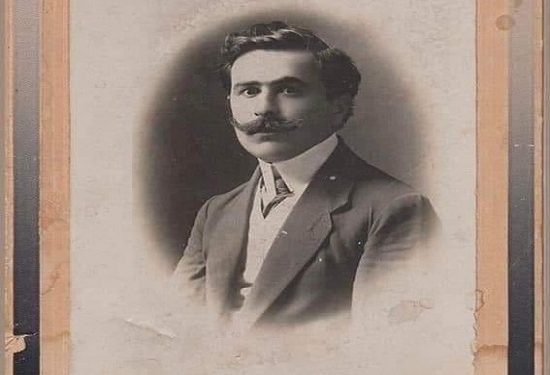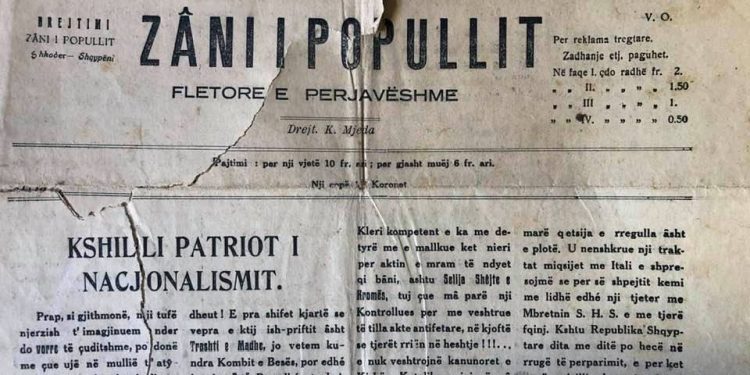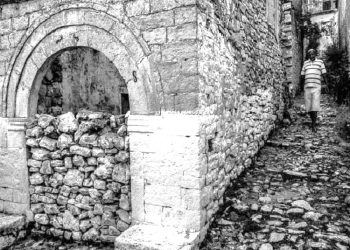By Doc. Dr. Zyhdi Zekja & Namik Kruja
Memorie.al / A forgotten person, but who deserves to be remembered is also Kol Mjeda. It should be mentioned that some members of the Mjeda tribe are known in the city of Shkodra, for their contribution to patriotic and religious issues, as well as in the field of language and art, such as Ndre Mjeda and Monsignor Lazër Mjeda.
Kol Mjeda was born in Shkodra on December 4, 1895. He finished primary school in Shkodra, while he completed his technical high school in Dresden, Germany, where he later graduated from the superior technical school in Stylistics (Men’s clothing fashion). Although far from his homeland, he maintains regular contact with his family, relatives and friends, without excluding friends, young people and foreigners.
Upon his return to Albania, Kola began to practice the profession of stylist in the craft of tailoring, opening a fashion salon for men, where they sewed high-level stylistic clothing for men: “Bonjeure”, “Rontigeau”, the latest fashion, etc. .
Traces of the existence of this fashion salon exist in the guide or in the Guide of the city of Shkodra of that time; where his address and advertisement are reflected.
The existence of this fashion salon, made the people of Shkodra start to have a “revolution” in their civic clothing, where the old traditional fashion began to be abandoned and the new clothing that the people of Shkodra called “alla franga” began.
Already, the aristocracy, merchants, statesmen or intellectuals and students headed to the West, were able to make a “Bella figure” at all levels of Western and aristocratic society. The city of Tirana, even now, does not have such a craft, but neither do licensed fashion stylists and known as such. There are traders everywhere who exhibit products of others, but not “alla-Albanian” fashion products.
Everything like that, ie the fashion in our clothes, is dictated by other western or eastern salons and the “VIPs” go to other countries and for a jacket stamp. Thanks to his professional skills, Kola expanded handicrafts, employing up to six workers, with prominent professionals of that time in Shkodra, such as: Kol Tivari, Gjon Laca, etc. Kol Mjeda managed to increase his activity with a large workshop for that period, up to 60-80 workers. Having graduated in Germany in this field, as well as using references from Dresden, Kola managed from Shkodra, to conclude employment contracts with Austrian entrepreneurs for sewing custom clothing of foreign clientele.
This society, for the sake of truth, when it was formed, found the new Kola, but, after his return from studies and emigration, he found it complete and with a new vision. In 1919, Kola becomes its chairman, building its statute according to Western and democratic rules. This society formed its board, with the vice-president and two secretaries, the cashier, the accountant and the doctor.
This society then becomes the nucleus of the creation of an association, to which up to 60 thousand people manage to adhere, such as: workers, craftsmen, small and medium traders.
This association came to the aid of its members in cases of grief (death) and joy (marriage); in cases of illness, up to bankruptcy crisis or in case of disaster, such as fire and flood.
This association also became a promoter of labor movements in the Balkans, such as in Montenegro, Mitrovica, and even in Croatia, teaching other associations how to demand their rights from employers. Despite the deliberate politicization, Kristaq Misha, in his book “Workers ‘Movement”, cannot argue and present the Workers’ Movement in Shkodra as “revolutionary”. Kola is one of the first young people from Shkodra, initiators of the organization of the Trade Union Movement in Albania.
At the initiative of mainly workers from Shkodra, who had worked mainly in: Austria, Italy, Bosnia, Montenegro, etc., trade union and democratic ideas were spread. Various workers and craftsmen who worked in difficult working conditions, from time to time submitted their requests for salary increases, for a reduced working hours, etc. To carry out their demands, they also organized strikes, such as those of 1901, and then in 1905 and onwards.
On April 1, 1907, the “Workers’ Aid Society” was established in Shkodra, headed by: Simon Rranxin, Kol Mjeda, Kol Luka, brothers Daia and Dajçi, Hilmi Drishti, Anastas Zaqora, Gjon Lacaj, Et’hem Behri, Kel Marubin , Abdyl Jasharin et al. The activity of this society, with small interruptions, according to the socio-political conditions, continued until the occupation of Albania by fascist Italy in 1939. To sensitize the public opinion, the activity of this society was also reflected in the press of the time.
Kol Mjeda was one of the main founders of the Trade Union Movement of Shkodra and, in different periods he was also secretary, vice president and president of this society. He is the initiator of beneficial actions and activities, as is the case with the creation of the Music and Artistic Society “Rozafa”.
In 1918, Kola played the clarinet and with orchestral groups performed for the people on national holidays. For his skills and the reputation he enjoyed among the masses of employees, the society also elected him a member of the City Council, where with great dedication, he defended civil rights.
For more than 20 years, Kol Mjeda, has worked tirelessly as one of the leaders of this company, until the triumph of Legality. With the experience gained in the Trade Union Movement, which helped him get acquainted with the social problems of the country, Kol Mjeda, since 1924, began to dedicate himself to politics and to deal with the government of the Albanian state, in various tasks.
At first he was the mayor of Shkodra. For some legislatures he has been a deputy of Shkodra and manages to be elected vice president of the National Assembly. It is worth remembering that in the elections of the deputies of the Prefecture of Shkodra in 1925, 8 people came out, people heard as: Maliq Bushati, Tef Gera, Ndrek Kici, Zenel Mandia, etc., and among them was Kol Mjeda, who received the largest number of votes. At the end of his career (about 3 years), Kola was also the prefect of Dibra District.
Kol Mjeda would respond to the appointment to state duties with seriousness and great commitment, gaining not only the sympathy of his fellow citizens, but also of all those with whom he cooperated. Thanks to his talent and dedication, Kol Mjeda has also made a modest contribution to the journalism of the time. In 1925, Kola competently directed for a long time the weekly notebook “Zani i Popullit”, which was published in Shkodra. He has also collaborated and written articles in the prestigious magazine “Leka”.
From the published articles, we mention: “National Economy and Agriculture”; “How to get rid of inondations”, “On the education of the sense of homeland”, etc. Kol Mjeda together with his cousin, Dom Ndre Mjeda, in June 1930, visited the birthplace of Budi (the ancient writer), where they got to know each other closely and studied the lands, the tribe, the language of Monsignor Pjetër Budi. This visit, Kol Mjeda reflects very nicely in the magazine “Leka” (in July 1930), which clearly shows the personality and greatness of this enlightened matjani.
Kol Mjeda’s life is a good example that proves that ambition motivates you to walk in life. From a craftsman, he manages to become an intellectual who spoke 4 foreign languages: German, Italian, Serbo-Croatian and Turkish, and even competently led important state tasks.
Kol Mjeda’s political conviction was that: Monarchy is the best form of regime. He said: “Only Ahmet Zogu could lead the Albanian state, thanks to his rare political and military skills, and that only he could lead the country towards progress, following the example of the most developed countries.”
On August 25, 1925, in the first session of the Constituent Assembly, the deputy of Shkodra, Kol Mjeda, asked for the speech in which he said: “In this season, five centuries ago, the Albanian leaders had gathered in Lezha, in the historic Great Assembly Today, I propose that the Constituent Assembly, to convey the wish of the people, to present to the Savior of the Nation, the Crown of the Kingdom of the Great Skanderbeg …! Here, your great-grandson, Zogu, is taking your place, the very one who, with his chest and sword, became the savior of the Nation.Are you against Naim? But you, Vaso Pasha, where are you? Come here and write two verses from your heart, and tell the world that the Albanian people, who guarded the Throne of the great Skanderbeg between the wars, today are proud, are rising with the great Zog – the King of the Albanians “.
***
We remember this trade unionist and MP of the Kingdom of Albania on the occasion of the anniversary of his death in Burrel Prison, on April 24, 1951, accused of being “Enemy of the people”. His family was persecuted for half a century by the communist dictatorship and, even to this day, he has not been able to find the remains of his patriotic father. Memorie.al












